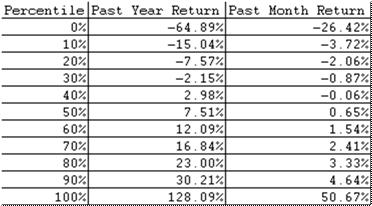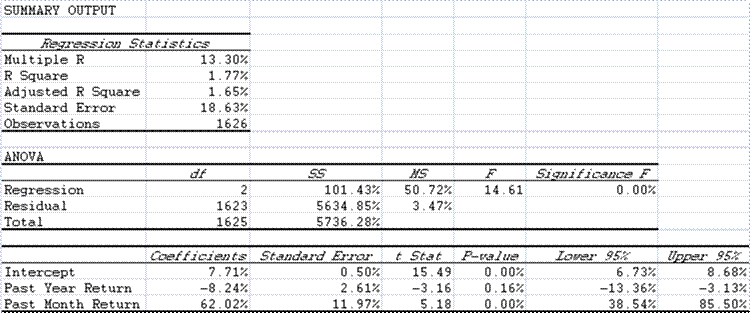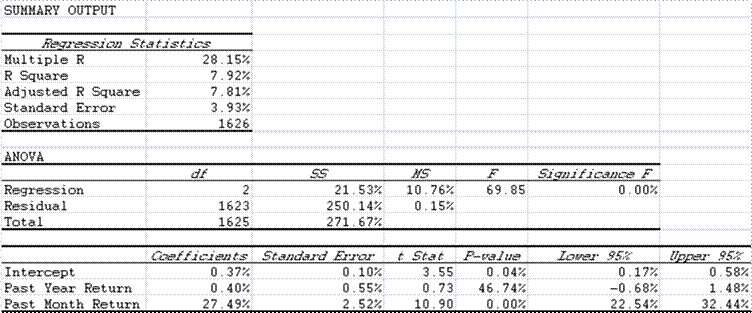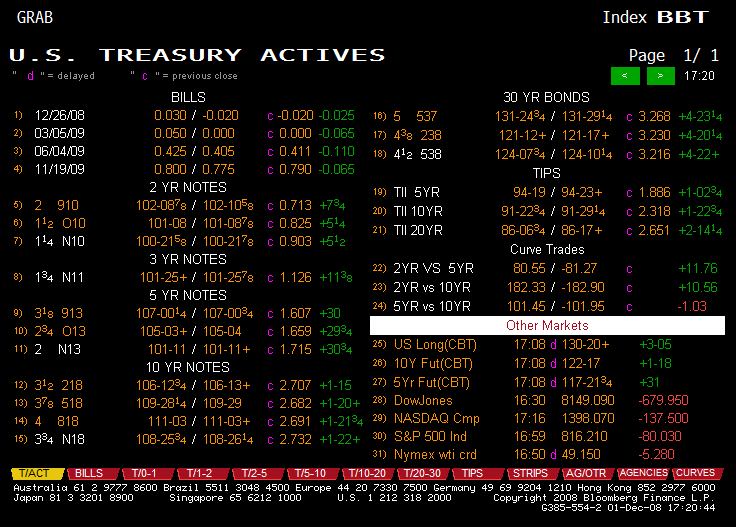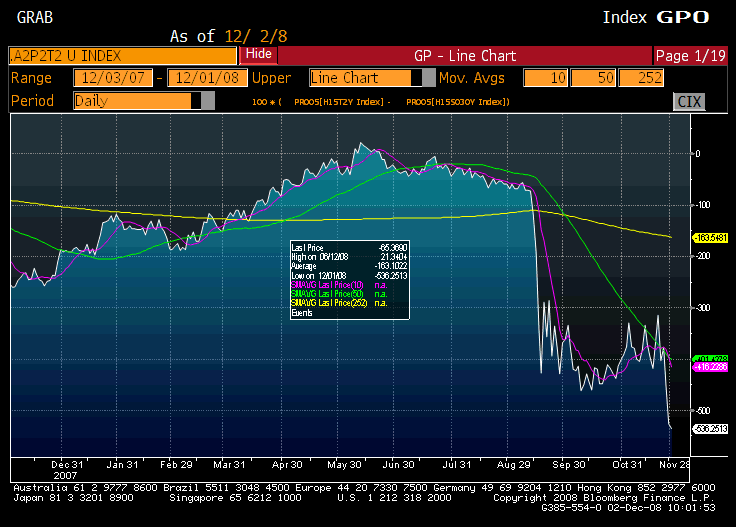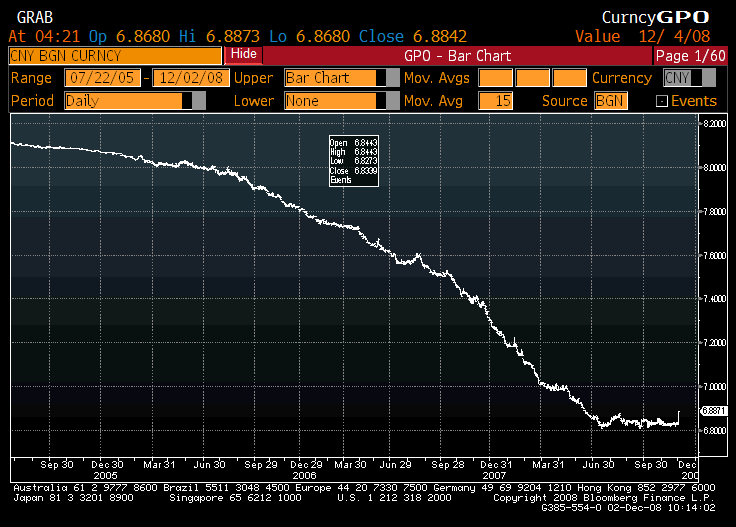1) What a mess.? I had been lightening up on equity exposure over the last week, but seemingly not enough.? The last three months have been hard for me, with my performance trailing the S&P 500 in each of the last three months.? Well, at least I admit it when I lose; let’s see if I can’t do better in the future.
2) The rally in long Treasuries is the cousin to the fall in equities.

A $4 move in the long bond would be significant enough — that is a top 5 move, but the shocker is seeing the 30-year yield near 3.20%.? That should lead to lower mortgage yields, refinancing, and perhaps, lower rates in the short run.? The long run is another matter.
3) Part of this came from Bernanke’s comments that the Fed would buy Treasuries.? If I may, what isn’t the Fed going to buy?? Do they really want to flatten the yield curve when the long end is this low already?? Don’t they have enough to do with instruments that have credit risk?? They can flatten the Treasury curve, but the corporate yield curve is out of their reach for now.
4) One example of that is the junk bond market, where the average yield is now over 20%.? Areas where the government does not guarantee see little liquidity, because government guarantees in other areas help siphon liquidity away.
5)? So I’m not impressed with the FDIC insured bond offerings from a public policy standpoint.? They crowd out non-guaranteed bonds.? But I would be inclined to buy the bonds in place of allocations to Treasuries or Agencies.
6) TIPS, excluding the long end, are trading below par.
 Also, the on-the-run securities are trading at a premium, because their inflation factors are close to 1 because they are young securities.? The inflation factors can’t go below 1, but older securities can see more past inflation erased, should we get a period of sustained deflation.? I don’t see that coming over the intermediate-term, but in the short-term we could see that.? Eventually the Fed will have to monetize many of the promises that it is making.
Also, the on-the-run securities are trading at a premium, because their inflation factors are close to 1 because they are young securities.? The inflation factors can’t go below 1, but older securities can see more past inflation erased, should we get a period of sustained deflation.? I don’t see that coming over the intermediate-term, but in the short-term we could see that.? Eventually the Fed will have to monetize many of the promises that it is making.
7) Perhaps we need another means of calculating how bad it is for non-guaranteed areas of the market, like A2/P2 CP.? That is a true horror.? I remember criticizing those investing in levered nonprime CP back when I was writing for RealMoney, but most of those investors are dead or gone now.? My measure of credit stress, the 2-year Treasury less A2/P2 yields, is at a new record.

8 ) It is no surprise here that GM is scrambling, as are the other automakers.? Let them try to get debtors to compromise.?? They will try to get the PBGC to take on the pension liabilities in foreclosure, though that may not be so easy.? They have refused to accept some liabilities in the past.
9) I was an early critic of reverse auctions organized by the US Treasury, largely because of the complexity involved.? I guess it took Paulson longer to realize the immensity of setting up those auctions.? It’s not as if the problem is unsolvable, but it would take a lot of work, and the payoff at the end is uncertain.
10) Is anyone else concerned that the Yuan is falling relative to the US Dollar? This graph gives the history since they “floated” the Yuan.? (Note the dirty float free market-like movements. 😉 )

Granted, it is a large-ish 2-day blip, but for the global economy to heal, we need China to begin to use the large surpluses that they have built up, buy abroad, and build up their domestic markets.
It would be a simple matter of fairness as well.? As it is, the surpluses in the government’s hands fuel a bloated financial system and inflation, which could be partially solved by importing more goods for their citizens to buy.
11) It’s my view that the economics profession comes out of this crisis with a black eye or two.? There is a lot of room for humility here.? Neoclassical economics does a lousy job of understanding how the real economy (goods and services) interacts with the financial economy (stocks, bonds, etc.).? That is a strength of the Austrian school, though.
Even on a microeconomic basis, periods of stress like this can make one question some of the theorems of Modigliani and Miller.? The way that assets are financed does make a difference when there is financial stress, and even more in insolvency.? Also, the financing windows are not always open.? Theories that rely on markets remaining open and liquid, such as many arbitrage-type arguments are not valid except when the market has “fair weather.”
12) There is no shortage of liquidity for the US Treasury, which takes that liquidity, gives T-bills to the Fed, which uses them to replace bail out specific lending markets, and downgrade the quality of their balance sheet buy up securities where liquidity is temporarily in short supply.? Personally, I don’t think it will work.? It is much easier to get into a market than to get out, particularly if you are a large player with no profit motive.? Three last semi-related articles that I found interesting:
T-bills are in high demand, perhaps the government should take advantage of it and issue a lot of them.? There are some dangers though:
a) This could be what finally does in the dollar.
b) The US debt maturity structure has been shortening of late — I wouldn’t want it to get too short, or we could face rollover risk, as Mexico did in 1994.
It might be better for the US Government to lock in long funding rates while they are available.? Who thought the 10-year or 30-year could be so low?


